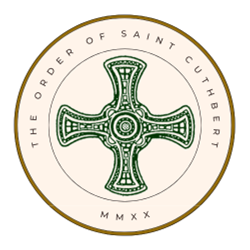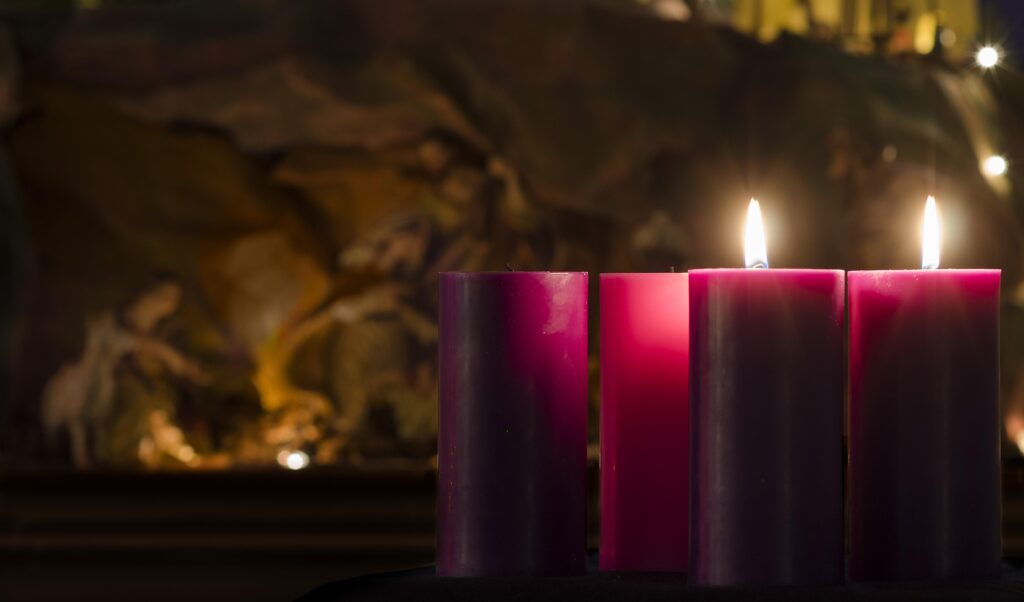
Gaudete!
Blessings to you this third week of advent. May the grace of our Lord Jesus Christ, and the love of God, and the fellowship of the Holy Spirit be with you all. This week many of us light the rose-colored candle in our advent wreaths and may even notice rose colored vestments and paraments in our parishes. They are indeed rose, in case you are wondering, not pink. As our preparations of heart and mind, hearth and home, continue during this most blessed season of hopeful anticipation we pause to recognize the joy of this season.
Some, however, may be wondering, is joy even still possible in the midst of my current circumstances. There are many throughout our communities, our parishes, and throughout this world, who continue to suffer in fear, sickness, loneliness, and depression. As we prepare for another national election in the coming year we are faced with how divided and polarized our national is. Is joy still possible?
It may seem as though, here in midwinter, is not the best time to consider Joy, but I would argue it is especially appropriate. Is joy still possible?
Yes, and not only is it possible, it is expected. We are children of God, and that means we have an eternal hope. Hope which is not dependent on our circumstances. It is from this hope, that our joy is derived, not from our circumstances, not from the conditions of the day.
As we review the lessons from Holy Scripture appointed for this third Sunday in Advent, there is much to consider. The Prophet Isaiah adds his voice to the chorus which foretells of a time of great peace and blessing, a time when the circumstances of this age are replaced with the peace of God, a time of rejoicing, joy, and gladness. This is echoed by Saint Paul in his epistle to the Church in Thessalonica when he tells them, and us, to rejoice always.
In fact, he gives a set of instructions to them, which are surly profitable for us as we consider this season of hopeful anticipation, of readying ourselves for the coming of our Lord. “Be at peace among yourselves. And we urge you, brothers, admonish the idle, encourage the fainthearted, help the weak, be patient with them all. See that no one repays anyone evil for evil, but always seek to do good to one another and to everyone. Rejoice always, pray without ceasing, give thanks in all circumstances; for this is the will of God in Christ Jesus for you. Do not quench the Spirit. Do not despise prophecies, but test everything; hold fast what is good. Abstain from every form of evil.”
This list of 14 instructions, is our marching orders. This is what is expected of us, and how we hope to find peace in this life and live with Joy. How many of these instructions align with our current cultural norms? Not many—which is why our culture is so lost in hopelessness and despair right now.
We have become a society which has lost sight of God and who has idolized happiness. Throughout our nation’s military culture, we are fixated on building resilience; it is worked into almost everything we do. How does this activity, this initiative or effort contribute to resilience and readiness?
The reason this is such a focus for us is because it is clearly absent in our formations and in our culture at large. We are not a ready and resilient culture, because we have lost sight of the source of resilience and have become fixated on the very thing that often undermines it.
There is not genuine resilience outside of God, period. Every other attempt is a cheap imitation and temporary fix to a problem that so many just don’t understand. Human beings were not meant to live separated from God, that was not the intent, that is not how we were designed, and there is absolutely nothing we can do get around that.
No matter how many esteemed celebrities, politicians, and billionaires may try find some other way, the truth remains, there is but one way, and that is Jesus Christ. They are lost because they have lost sight of God and have replaced him with the idol of happiness. This is what is often confused with Joy, but not only is it a cheap imitation, it is often the very thing that robs us of our joy.
To idolize happiness is to chase after what makes you feel good. To prioritize the moment. It is short-sighted and self-focused. Lost in the promise of instant gratification.
Joy, on the other hand, often comes at the denial of happiness. We are happy eating the doughnut, but then depressed looking at ourselves in the mirror a week later. Some may be happy to go out partying with friends, to live for the moment, but then depressed just a few hours later, locked up in jail for drinking and driving. Many are all too happy to jump into bed with whomever has caught their attention, only to be depressed when diagnosed with some STD or unwanted pregnancy.
There is not much good that comes from chasing happiness. The pursuit of your immediate happiness often robs you of your lasting joy. As Christians, we are called to a disciplined life. We do not just eat and drink what we like, when we like. We do not just chase after our own indulgences and disordered affections. We realize that often joy comes from sacrifice.
The joy we feel when we are able to truly help others. The joy of a parent who spends years sacrificing their own instant gratification, to see their children become honorable men and women. The joy of community, good health, and faith which comes from daily sacrifice and discipline. We are called to joy, but more importantly, we are called to live our lives in such a way that conditions are set for joy, and that is the true value in Saint Paul’s instructions.
So yes, joy is still possible today, it is possible, and it is expected as part of a life lived consecrated to Christ. As we consider how we might follow in the example of Saint John the Baptist, to be a voice in the wilderness of this time and this culture, to make straight the path of the Lord, let us do so with Joy. May our focus be in making ourselves ready for our Lords return so that, like Saint John, we might find our joy complete in hearing the voice of our Bridegroom, Christ Jesus our Lord.
Lord, may we truly be found a people acceptable in Your sight at Your return. Grant us the grace to repent, to reorient ourselves to You in every aspect of our lives. To not become lost in the pursuit of fleeting happiness but rather grounded in the joy of Your perfect love. We ask this in Your most honored name Lord Jesus Christ, who lives and reigns with the Father and the Holy Spirit, One God, now and evermore. Amen.
Blessings,
Kenneth++
Abbot, OSC


